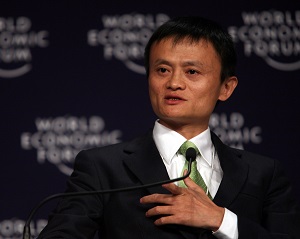 |
| Alibaba chairman Jack Ma |
Chinese Internet giant Alibaba suffered two blows this past week: the China Food and Drug Administration (CFDA) announced that it will no longer work with the company on an initiative to track medicines to ensure their authenticity, and a pharmacy chain has filed a lawsuit against the company saying the initiative gave it an unfair advantage over other drug sellers.
CFDA Vice Director Sun Xianze held a confab with 20 pharmacy and drug companies and wholesalers on Jan. 27 at which the decision was announced to curtail the deal with Ali Health, a subsidiary of Alibaba, according to media reports.
The original initiative was launched in 2013 and was designed to have drug companies and pharmacies use bar codes tied to an official database that would track drugs to ensure they were authentic.
China, like neighboring India, has suffered from a rash of incidents in which drugs and other goods like baby formula were either fake, adulterated in dangerous ways, or were not tested properly.
The CFDA said in late January that 20 wholesalers had been selling unlicensed drugs since 2014, according to a report by the respected magazine Caixin.
The original plan with Alibaba had its detractors early on who complained about the costs involved and said the plan would do little to stop fake drugs from getting into the hands of unsuspecting patients.
CFDA officials said they would continue to push for the bar code tracking system, but would instead work with a nonprofit institution and not a commercial entity, according to the report.
Meanwhile, Alibaba found itself in the middle of a lawsuit filed in late January by Yangtianhe Pharmacy, which is based in the central province of Hunan. The suit says the CFDA broke the law by partnering with a commercial entity to create the system, which is called the Product Identification, Authentication and Tracking System.
The pharmacy's president, Li Neng, told Caixin that the CFDA "was using the authentication system to collude with a company so that it could profit off the public."
The CFDA revoked the company's license to operate because it refused to upgrade its computer network to accommodate the new system, according to Caixin.
China is a huge market for pharmaceutical makers, and healthcare spending is expected to hit $1.3 trillion by 2020, according to a Reuters report.
- here's the report from Caixin and one from Reuters